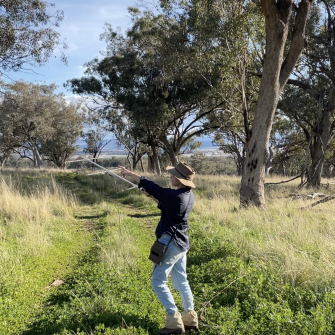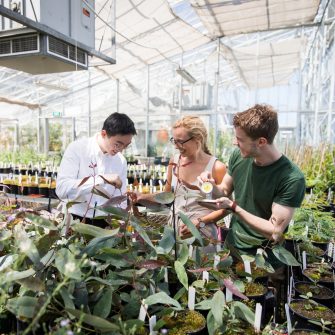Bachelor of Psychology (Honours)
- Commencing Terms
- Term 1
- Duration
- 4 Year(s)
- Delivery Mode
- Face-to-face (includes blended), Research
- Campus
-
Kensington
- Codes
- UAC code 429850
- Program code 3632
- CRICOS code 088874M
-
ATAR/2025 lowest selection rank
- 97.0 View all admission criteria
-
2026 Indicative first year full fee
- $14,500*
-
2026 Indicative full fee to complete degree
- $51,000*
-
2026 Indicative first year full fee
- $61,000*
-
2026 Indicative full fee to complete degree
- $267,500*

Application closures for 2026
International applications for all undergraduate programs, as well as postgraduate programs offered by the faculties of Arts, Design & Architecture, Engineering (excluding Master of Information Technology and associated programs) and Science are now closed to New Overseas Student Commencement (NOSC) for 2026 intakes.
Postgraduate programs offered by the Business School and the faculties of Law & Justice and Medicine & Health remain open. Master of Information Technology (and associated programs) also remain open.
- Overview
- Entry requirements
- What will I study?
- Careers in psychology
- How to apply
- Fees & Scholarships
- FAQs
Overview
Uncover why we think and act the way we do with the Bachelor of Psychology (Honours). Psychology is one of the most interesting and challenging areas of scientific inquiry with the potential to benefit both individuals and society as a whole.
This degree explores the science of behaviour and mental processes, providing you with an understanding of the brain, cognitive and decision-making processes and mental health. Your study will include:
- memory
- learning
- cognition
- perception
- neuroscience
- language
- developmental psychology
- forensic psychology
- social psychology
- abnormal psychology.
At the completion of this degree, you can head out into the workforce or continue along the path to becoming a registered psychologist with an area of practice endorsement by completing an additional two-year master’s degree in psychology.
Key features
- Professional recognition
This four-stage program is accredited by the Australian Psychology Accreditation Council (APAC). It satisfies the minimum requirement for provisional registration and acts as the first step in the six-year pathway to becoming a registered psychologist.
- Research experience
In the fourth year of the program, you’ll conduct a major research project under the guidance of one of our expert academic supervisors. Your research project can be taken in most areas of psychology. Successful completion of this professional and highly competitive degree will prepare you for the Master of Psychology degree.
- Flexibility of choice
You can choose from a range of specialised electives to tailor your study to your interests. Some of these include:
• psychology and law
• vision and brain
• developmental psychology
• psychopathology
• health psychology
• language
• cognitive science
• neuroscience.
- Wide range of career opportunities
Psychologists deal with more than just mental health – they apply their knowledge to relationships, workplace stress and financial challenges. The modern-day psychologist may work across a range of environments including health, business, sport, marketing, human resources, education and more. Using your skills in psychology, you may be responsible for facilitating organisational change, exploring new ways of thinking or influencing marketing campaigns.
Why study at UNSW?
Learn with the best
UNSW Science is at the forefront of many new scientific developments, teaching and innovation. We’re responsive to the needs of industry, adaptive to change and take an innovative approach to teaching and learning. We’re ranked #2 in Australia and =#32 globally for psychology (QS World University Rankings by Subject, 2025).
Learn from industry-leading educators
You come to university to learn from the experts – researchers who are leaders in their fields, striving to create new knowledge. The School of Psychology is well known for its research tradition. Many of our staff have international reputations in their respective fields and a number are Fellows of the Australian Academy of Social Sciences. Our staff attract several million dollars in external research funds per year. Our staff publications receive more citations than any other psychology department in Australia and we have one of the highest rates of PhD graduations in psychology of any Australian university. We earn more competitive research funding and publish more Tier 1 journal articles per academic than any other psychology school in Australia.
Access cutting-edge facilities
Our teaching facilities include world-leading behavioural neuroscience laboratories and cognitive testing laboratories running specialist software that will allow you to design/implement your own psychological research and analyse/interpret the data you collect. You’ll also gain access to laboratories for the analysis of cognition and brain function, including electroencephalography (EEG), transcranial magnetic stimulation (TMS) and eye-tracking.
Join a supportive student community
The Psychology Peer Mentoring Program has been helping first-year students make a successful transition to university for over 20 years. The program matches small groups of first-year students with a pair of third-year students majoring in psychology. Your mentors will provide guidance on topics like exam preparation, careers within psychology and time management.
The UNSW Psychology Society (PsychSoc) brings students together to help you make the most of your time at university. Whether you’re looking for social events, academic help or career information, PsychSoc has you covered.
Want to see more from UNSW Science?
Entry requirements
-
- The 2025 Lowest Selection Rank (LSR) is the adjusted rank (ATAR plus adjustment factors) you would have needed to gain entry to this degree in 2025.
- The 2025 A levels score is based on four Advanced Level (A2) subjects. Entry scores are calculated from the best three or four A2 subjects (excluding repeated subjects) using the following values: A*=6, A=5, B=4, C=3, D=2, E=1. At most one Applied A Level subject may be included in the best four subjects used to calculate the aggregate.
- The 2025 IB Diploma is an indication of the IB you would have needed to gain entry to this degree in 2025. It is to be used as a guide only.
- The 2025 Lowest ATAR is the lowest ATAR (before adjustment factors were applied) to which an offer was made. Where <5 is listed, this indicates that less than 5 ATAR-based offers were made and so the score has not been published. N/A indicates no offers were made on the basis of ATAR.
*The Lowest ATAR to which an offer was made, for this program, is based on a UNSW Gateway Early Conditional Offer.
-
At UNSW, we are committed to ensuring prospective students have all the information they need in order to make informed decisions about their study options.
To assist you in gaining a better understanding of how Admissions works at UNSW, we have provided you with a summary of ATAR offers and the student profile.
We hope this information will help you identify the degree that is right for you.
Assumed knowledge
Mathematics Advanced
Adjustment Factors
We offer a range of adjustment factor schemes that reward students for academic performance and extra-curricular achievements. These schemes also take into account a range of personal and educational disadvantages that may have affected your studies.
Elite Athletes, Performers and Leaders (EAPL)
This program recognises achievements in the areas of sport, academia, leadership and music at an elite level. You may be eligible for up to five points.
Educational Access Scheme (EAS)
Factors such as illness, financial hardship, language difficulties or attending a particular school can mean you don't always get the best possible marks in Years 11 and 12. If one of these situations applies to you, submit an application for the Educational Access Scheme (EAS) via UAC. Eligible students can receive between 1 and 10 points towards their chosen UNSW degree.
Admission pathways
Your ATAR is not the only measure of your potential to succeed, which is why we offer a range of pathways into university. Explore your options below and get in touch with our Future Student Advisers to discuss your path to UNSW.
Gateway Admission Pathway
This scheme is open to students who attend Gateway schools, live in a low-socioeconomic area based on IRSAD and IEO indexes of SEIFA criteria, or are an Aboriginal and Torres Strait Islander person. It adjusts the ATAR requirements for your preferred UNSW degree and provides early offers and early conditional offers to UNSW.
Entry programs for Australian Aboriginal and Torres Strait Islander people
We offer entry programs for Indigenous Australians, including the Indigenous Preparatory Programs and the Indigenous Admission Scheme (IAS). The entry pathway program you apply for will depend on the degree you want to study.
Progression requirements
Entry into the fourth year Honours program is competitive and subject to academic performance, based on your Psychology Average (Distinction minimum) within your degree. Students may exit the program after three years with a B Psychological Science award if they are unsuccessful in applying for entry into Honours.
English language requirements
You may be asked to provide evidence of your English proficiency to study at UNSW depending on your educational background and citizenship. English language skills are vitally important for coping with lectures, tutorials, assignments and examinations - this is why UNSW requires a minimum English language competency for enrolment.
If you’re completing an Australian Year 12 qualification (e.g. NSW HSC or equivalent), you do not need to provide anything extra to prove your proficiency. Your qualification will be used as evidence of your English proficiency.
If you do need to provide evidence of your English proficiency, this will be indicated in your application. You can prove this by providing evidence that you meet one or more of the following criteria:
- English language tests and university English courses
- Prior study in the medium of English
- Other qualifications
If you need to improve your English skills before you start your degree, UNSW College’s Academic English Programs are for you. The programs are suitable for various English levels and help you prepare for university studies and life in Australia.
For more details, visit the English Language Requirements page.
International direct entry
Information for applicants with CBSE, HKDSE or Singapore A Levels Qualification
Calculating your CBSE Score:
Awarded by CBSE, average percentage marks across English or Hindi, and your best four remaining subjects. Where marks are given as a range, the mid-point for that range is used e.g. 75 to 80 = 77.5.
Calculating your HKDSE Score:
Entry requirements are based on the aggregate of the best 5 achieved category A subjects (category B and C subjects are not considered).
For subjects other than Citizenship and Social Development: level 5**=7 points, level 5*=6 points, level 5=5 points, level 4=4 points, level 3=3 points, level 2=2 points, level 1=1 point, Level U=0 point.
For subject Citizenship and Social Development: Attained=2 points, Unattained=0 point. Citizenship and Social Development will only be counted towards the aggregate if the 2 points awarded for Attained ranks among the student’s best five scoring subjects.
If Mathematics Compulsory Part and Extended Part (Module 1 or 2) are both presented, both scores can be counted.
Calculating your Singapore A Levels:
Due to significant changes to the GCE A-Level Curriculum and University Admissions Score (UAS) calculation effective 2026, UNSW assessment is currently under review.
Note: Entry requirements published on this page are correct as of the day of publication and may change without notice.
We do not accept secondary qualifications from this country. We may accept tertiary study results, please contact us for more information.
Please contact us for direct entry requirements.
Admission pathways
If you do not meet the requirements for direct entry into your chosen degree, you may be eligible for a pathway program with UNSW College. UNSW College provides alternative entry options using university-approved content so that you can start your UNSW journey with confidence.
Progression requirements
Entry into the fourth year Honours program is competitive and subject to academic performance, based on your Psychology Average (Distinction minimum) within your degree. Students may exit the program after three years with a B Psychological Science award if they are unsuccessful in applying for entry into Honours.
English language requirements
You may be asked to provide evidence of your English proficiency to study at UNSW depending on whether you are from an English-speaking background or non-English speaking background. English language skills are vitally important for coping with lectures, tutorials, assignments and examinations - this is why UNSW requires a minimum English language competency for enrolment.
If English is not your first language, you’ll need to provide proof of your English proficiency before you can be given an offer to study at UNSW. You can do this by providing evidence that you meet one or more of the following criteria:
- English language tests and university English courses
- Prior study in the medium of English
- Other qualifications
If you need to improve your English skills before you start your degree, UNSW College’s Academic English Programs are for you. The programs are suitable for various English levels and help you prepare for university studies and life in Australia.
For more details, visit the English Language Requirements page.
Check the specific English language requirements for this program
What will I study?
UNSW is introducing a new academic calendar from 2028.
We are moving to a new flex-semester calendar. What does this mean for your studies?
Program structure
Psychology is a discipline of both scientific research and applied practice. As a science, psychology is concerned with the study of behaviour and its underlying mental and neural processes. Your study will cover a range of topics, including:
- learning
- memory
- cognition
- perception
- language
- neuroscience
- life-span development
- personality
- social psychology
- abnormal psychology
Full program structure
The Bachelor of Psychology (Honours) is offered as either a single or a double degree.
-
As a single degree, the Bachelor of Psychology (Honours) is made up of 24 courses plus an honours year taken over four years of full-time study.
Type
Units of Credit (UOC)
Number of courses
Psychology courses (core & electives)
96
16
Free electives
36
6
General education
12
2
Honours year
Full-time honours (48 UOC)
-
- Psychology 1A
- Psychology 1B
- Introduction to Psychological Applications
- Measuring Mind and Behaviour
- Research Methods 2
- Social and Developmental Psychology
- Perception and Cognition
- Learning and Physiological Psychology
- Assessment, Personality and Psychopathology
- Research Methods 3
- Research and Applications of Psychology
-
In your fourth year, you’ll conduct a year-long, major independent research project under the guidance of an academic supervisor and write a thesis based on the project. Your project can be undertaken in most areas of psychology including:
- psychopathology
- behavioural neuroscience
- cognitive science
- cognition and perception
- forensic psychology
- social, personality and developmental psychology.
You’ll also complete advanced core and elective coursework in Terms 1 and 2.
Honours is the next step towards becoming a registered psychologist. You must complete an honours program to be eligible for entry into a psychology master's degree.
Future careers
This program is designed to match global career opportunities, preparing you for work in a range of organisational settings. We’ll equip you with an understanding of assessment, diagnosis, prevention and treatment of problems at an individual and organisational level.
Pathway to registration
A minimum six-year sequence of education and training in psychology is required to become eligible for registration as a psychologist in Australia. This degree is a four-stage full-time program that’ll give you the best preparation to become a registered psychologist. It’s fully accredited and satisfies the minimum requirement for provisional registration with the Psychology Board of Australia.
Work across a range of industries
You can work in a range of organisations within the public and private sector, such as public, community and occupational health, counselling, developmental care, management consultancy, human resources, recruitment, training and development, industrial relations, banking, journalism, marketing, business, retail management and statistical and data analysis.
Career outlook
As psychology informs a range of diverse industries, the number of available jobs is increasing. Within the next five years, job openings are expected to increase by 30%, which means that each year, 7,600 new jobs will be generated (Jobs and Skills Australia, 2025).
Accreditation
This degree is a four-stage full-time program that’ll give you the best preparation to become a registered psychologist. It’s fully accredited and satisfies the minimum requirement for provisional registration with the Psychology Board of Australia.
Our alumni
“Studying the Bachelor of Psychology at UNSW opened my eyes to the breadth and depth with which psychology actually applies to every aspect of working life – be that in a clinical, academic or corporate setting. Having an understanding of human behaviour and why people do what they do at a neurological and psycho-social level has undoubtedly helped me to better work with colleagues, work with clients, lead teams and influence change.”
Sucheta Gorolay
Manager & Organisational Psychologist, Bendelta
How to apply
Applications for undergraduate study from domestic students (Australian citizens, Australian permanent residents, Australian permanent humanitarian visa holders and New Zealand citizens) are processed by the Universities Admissions Centre (UAC).
Visit the Apply section of the UAC website and you can nominate up to five degrees in order of preference, with the first being your most desired degree and university.
On-time applications for admission usually close at the end of September each year for Term 1 admission. Late applications can be submitted, but a late fee will apply. For study starting in Term 1, the majority of offers are made in December and January. Visit the UAC website for key dates for admission outside of Term 1.
Ready to start your application?
For most international students, applications are submitted via our Apply Online service. We encourage you to submit your completed application as early as possible to ensure it will be processed in time for your preferred term.
Some high-demand programs with limited places, may have an earlier application deadline or may have an earlier commencement date. For details, visit the international admissions information page.
*If you are an international student studying an Australian qualification, go to the Universities Admission Centre (UAC) for application and UAC key dates. Note: If you are under 18 years of age, you need to make special arrangements. For details, visit the under 18 international students page.
Ready to start your application?
Fees & Scholarships
Commonwealth Supported Place: Student Contribution Band 2
*The student contribution for a Commonwealth Supported Place is an indication only of the amount payable in Year 1 based on a standard full-time load of 48 credit points (1.0 EFTSL). The actual student contribution you will be liable for depends on your individual program of study and the calendar year in which you enrol. Actual fees are calculated upon enrolment. Student contribution amounts are subject to annual review by the university and may increase each year during your studies (subject to caps determined by the Australian Government), effective at the start of each calendar year.
The indicative fees listed here are based on an estimated average and are for tuition only - other fees and charges are not included.
*Fees are subject to annual review by the University and may increase annually, with the new fees effective from the start of each calendar year. The indicative fees listed here are based on an estimated average and are for tuition only, other fees and charges are not included. The amount you pay will vary depending on the calendar year to enrol, the courses you select and whether your study load is more or less than 1 Equivalent Full Time Student Load (8 courses per year).
Indicative fees are a guide for comparison only based on current conditions and available data. You should not rely on indicative fees. More information on fees can be found at the UNSW fees website.
Indicative fees to complete the program have been calculated based on a percentage increase for every year of the program. Fee increases are assessed annually and may exceed the indicative figures listed here.
Indicative fees to complete the program include tuition plus an estimate of study-related costs of approximately $1,000 per year. To find out more about other costs, visit UNSW International.
Scholarships
At UNSW, we award over $83 million in scholarships each year. We pride ourselves on rewarding excellence and making university accessible to students from all walks of life. Whether you’re a domestic or international student, our range of scholarships, prizes and awards can support your journey.
Featured scholarships
- The Ian and Barbara Burgess Memorial Rural Science Scholarship (UGCE1466)
- Science Achiever Award (UGCA1358)
Featured scholarship
- Science Achiever Award (UGCA1358)
Frequently Asked Questions (FAQs) about the Bachelor of Psychology
-
A psychology degree helps you understand why people think and act the way we do. There is a wide variety of career opportunities for psychology graduates available across the public and private sector, including in health, business, journalism, retail, education and research.
-
You need to complete at least six years of undergraduate and postgraduate study to become a psychologist. You then need to register with the Psychology Board of Australia.
-
There are no prerequisite subjects to study psychology, however you may be asked to provide evidence of your English proficiency. If you’re completing an Australian Year 12 qualification (e.g. NSW HSC or equivalent), your qualification will be used as evidence of your English proficiency.
-
A psychology degree involves learning the science of human behaviour and how we think, act and feel. A psychology degree is the first step to becoming a psychologist.
Progress starts here – at a world-leading university

Top 20 Worldwide
Ranked in the global top 20 for three consecutive years
QS World University Rankings, 2024–2026

Winner of the AFR Most Employable University Award six years in a row
AFR Top100 Future Leaders Awards, 2020–2025

Australia's #1 for Innovation
Highest number of startups and spinouts from university-developed tech
SCOPR report, 2024






